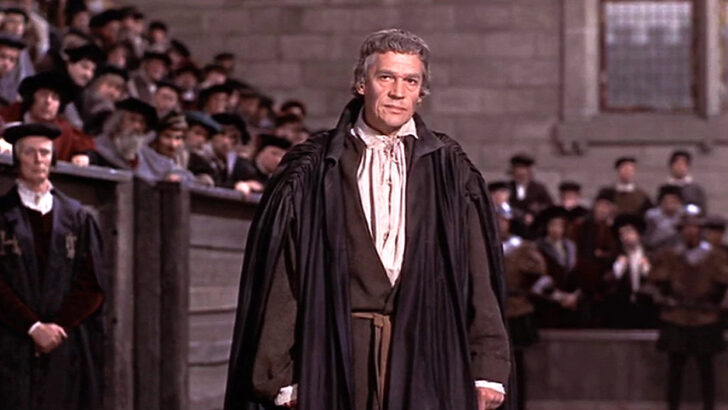Faith Development
Faith in film
Films are, first and foremost, meant to entertain us. We go to the cinema – or more often, watch on our TVs or phones – to laugh and to cry, to be inspired and overawed, to fall in and out of love.
But that’s not a film’s only purpose. From its birth, the “big screen” has been “the mirror of the human soul in its constant search for God, often unknowingly,” Pope St John Paul II told a gathering of the Vatican’s Council for Culture in 1998. The pope – himself a playwright and poet – had a great deal of respect for the art of film.
Released in 1995 to mark the 100th anniversary of cinema, the Vatican’s list of 45 films is divided into three categories, religion, values and art”
“With special effects and remarkable images,” he went on to say, “it can explore the human universe in depth… And when it reaches the heights of poetry, unifying and harmonising various art forms – from literature to scenic portrayal, to music and acting – it can become a source of inner wonder and profound meditation.”
At its best, film entertains and inspires, offering us an avenue to the soul. But there are more films that miss that mark than hit it. We have to be judicious in our choice of what to watch, and while that can be hard to do, in this column I hope to make your job a little easier by highlighting films that mirror the human soul in its search for God.
I’m going to begin by choosing a film from the Vatican’s own list of ‘great films’. Released in 1995 to mark the 100th anniversary of cinema, the Vatican’s list of 45 films is divided into three categories, religion, values and art.
Modern films
It’s a varied list, including anything from well-known modern films like Schindler’s List to one of the earliest depictions of Christ on-screen, the 1905 The Passion of our Lord Jesus Christ. For the first in these regular ‘faith on film’ reflections, I’m going to split the difference with the 1966 classic A Man for All Seasons, an entry in the Vatican list under the ‘religion’ category.
This Oscar winning biopic of St Thomas More, the English nobleman martyred by Henry VIII, is well acted, excellently filmed, moving and amusing. It is also theologically profound, surprisingly so for a Hollywood movie.
At the heart of our contemporary dismissal of human nature is a rejection of our Creator”
I’m giving away no secrets when I say, More dies in the end. A wise and pious man, he was a lawyer of great standing who was elected Lord Chancellor by King Henry VIII. But when King Henry declared himself head of the Church in England, More was forced to choose between his loyalty to the king and his loyalty to the Church. He refused to capitulate and was beheaded for treason. On this refusal hangs the great drama of the film.
At the heart of our contemporary dismissal of human nature is a rejection of our Creator. We like to see ourselves as god, masters of truth in our lives. The life of St Thomas More was built on the rejection of just such an ideology.
Man’s pride
The theme of man’s pride and its distortion of our nature is established in the opening shots; images of gargoyles, grotesque representations of nature, are followed by a shot of the chain worn by the Lord Chancellor, a symbol of worldly power.
These grotesque representations contrast the great natural beauty often surrounding More. For instance, when the English martyr and Henry VIII converse in a beautiful garden, Henry appears to be a force of nature. But his posturing and opulent dress are out of place in the surroundings, whereas More’s humility is perfectly in keeping. He reflects that which is good and beautiful in man’s nature, a contrast to the distorted image of man wrapped up in worldly things.
More’s conduct is shaped by his belief that he is “his majesty’s good servant, but God’s first”. This including his actions as a statesman, where he follows the guidance of his God-given conscience. In a comment that could easily have been intended for our own public representatives, More reflects that “when statesmen forsake their own private conscience for the sake of their public duty, they lead their country by a short route to chaos”.
A Man for All Seasons is a beautifully crafted reminder of what we are called to do for the love of God”
More suffers for his commitment, being locked away from his family in a dingy cell. The most moving and poignant scene in the film comes when his wife and daughter visit, pleading with him to swear the oath of loyalty to the king as head of the Church.
Memorably, More responds that “When a man takes an oath, he’s holding his own self in his own hands like water, and if he opens his fingers then, he needn’t hope to find himself again”.
His wife, in tears, asks him bitterly, “Haven’t you done as much as God can reasonably want?” It is interesting to note at this point that More has done all he possibly can to preserve his life, to escape martyrdom. But he knows that there is a point where, “finally, it isn’t a matter of reason,” as he tells his wife. “Finally, it’s a matter of love.”
A Man for All Seasons is a beautifully crafted reminder of what we are called to do for the love of God.



 Ruadhán Jones
Ruadhán Jones Paul Schofield stars as St Thomas More in A Man for All Seasons, the Oscar-winning biopic about the English martyr.
Paul Schofield stars as St Thomas More in A Man for All Seasons, the Oscar-winning biopic about the English martyr. 